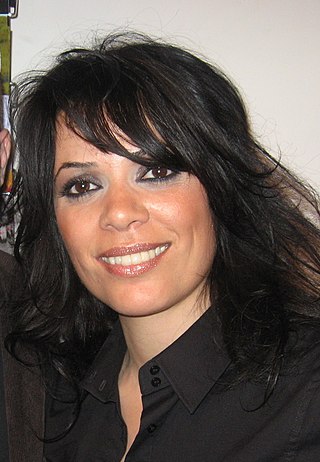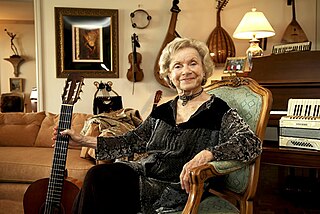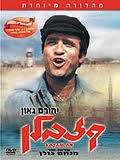Related Research Articles

Judith Durham was an Australian singer, songwriter and musician who became the lead singer of the Australian folk music group The Seekers in 1963.
Sephardic music is an umbrella term used to refer to the music of the Sephardic Jewish community. Sephardic Jews have a diverse repertoire the origins of which center primarily around the Mediterranean basin. In the secular tradition, material is usually sung in dialects of Judeo-Spanish, though other languages including Hebrew, Turkish, Greek, and other local languages of the Sephardic diaspora are widely used. Sephardim maintain geographically unique liturgical and para-liturgical traditions.
New-age is a genre of music intended to create artistic inspiration, relaxation, and optimism. It is used by listeners for yoga, massage, meditation, and reading as a method of stress management to bring about a state of ecstasy rather than trance, or to create a peaceful atmosphere in homes or other environments. It is sometimes associated with environmentalism and New Age spirituality; however, most of its artists have nothing to do with "New age spirituality", and some even reject the term.

Yasmin Levy is an Israeli singer-songwriter of Judeo-Spanish music.

Francesco De Gregori OMRI is an Italian singer-songwriter. In Italy, he is popularly known as "Il Principe dei cantautori", a nickname referring to the elegance of his lyrics.

Françoise Atlan is a French singer and ethnomusicologist, born in a Sephardic Jewish family in Narbonne, France on 27 July 1964. Her father was a lawyer and native of Béjaïa, Algeria, and her mother was a pianist and a lyrical singer.
Ofer Ben-Amots is an Israeli-American composer and teacher of music composition and theory at Colorado College. His music is inspired by Jewish folklore of Eastern-European Yiddish and Judeo-Spanish Ladino traditions. The interweaving of folk elements with contemporary textures creates the dynamic tension that permeates and defines Ben-Amots' musical language.

Flory Jagoda was a Bosnian Jewish–born American guitarist, composer and singer-songwriter. She was known for her composition and interpretation of Sephardic songs, Judeo-Espanyol (Ladino) songs and the Bosnian folk ballads, sevdalinka.
The Voice of the Turtle may refer to:

Judaeo-Spanish or Judeo-Spanish, also known as Ladino, is a Romance language derived from Old Spanish. Originally spoken in Spain, and then after the Edict of Expulsion spreading through the Ottoman Empire as well as France, Italy, the Netherlands, Morocco, and England, it is today spoken mainly by Sephardic minorities in more than 30 countries, with most speakers residing in Israel. Although it has no official status in any country, it has been acknowledged as a minority language in Bosnia and Herzegovina, Israel and France. In 2017, it was formally recognised by the Royal Spanish Academy.
Louis Harry Danto was a lyric tenor and cantor. He was acclaimed for his cantorial music, concert appearances and recordings of Italian, Russian, and French opera repertoire. Danto performed throughout North America, Europe and Israel, and recorded 24 solo albums.
Judith Wachs was an American musician and singer who promoted Sephardic music through her musical group, Voice of the Turtle of which she was the artistic director.

Titanic is a musical with music and lyrics by Maury Yeston and a book by Peter Stone. It is based on the story of the RMS Titanic which sank on its maiden voyage on April 15, 1912.

Nicolas Reyes is the lead singer, guitarist, songwriter, arranger, producer and founder of the French musical group Gipsy Kings, along with Tonino Baliardo, the group popular for their Spanish music in the 1980s. Even though the group members were born in France, he was brought up in a Spanish culture since their parents were gitanos who fled Catalonia during the Spanish Civil War.

Kazablan is an early Israeli Hebrew language play, staged first as a 1954 drama followed by a 1964 screen adaptation, later as a 1966 musical comedy, and still later produced as a 1974 musical comedy film. The name Kazablan comes from Casablanca, the birthplace of the main character.
Henrietta Yurchenco was an American ethnomusicologist, folklorist, radio producer, and radio host. She worked to save traditional music by recording in Guatemala, Mexico, the United States, and Morocco.

Yitzhak Isaac Levy ; May 15, 1919, Manisa, Turkey – July 21, 1977, Jerusalem, Israel) was an Israeli singer-songwriter, musicologist and composer in Judaeo-Spanish. He also worked as director of a radio program and was an author of various works on musicology.
Bouena Sarfatty, married name Bouena Sarfatty Garfinkle was a Jewish Greek World War II partisan, a writer of verse, and a renowned needleworker.

Bracha Zefira was a pioneering Israeli folk singer, songwriter, musicologist, and actress of Yemenite Jewish origin. She is credited with bringing Yemenite and other Middle Eastern Jewish music into the mix of ethnic music in Palestine to create a new "Israeli style", and opening the way for other Yemenite singers to succeed on the Israeli music scene. Her repertoire, which she estimated at more than 400 songs, included Yemenite, Bukharan, Persian, Ladino, and North African Jewish folk songs, and Arabic and Bedouin folk songs and melodies.
Judith Rita Cohen is a Canadian ethnomusicologist, music educator, and performer. Her research interests include Judeo-Spanish (Ladino) songs; medieval and traditional music from the Balkans, Portugal, French Canada, and Yiddish; pan-European balladry; and songs from Crypto-Jewish regions in Portugal. She has received numerous research and travel grants to do fieldwork in Spain, Portugal, Morocco, Israel, Turkey, Greece, France, Belgium, Canada, and the United States, and has published many journal articles, papers, and book chapters. She plays a variety of medieval musical instruments, and sings and performs as part of her lectures and in concerts and solo recitals. She is also the editor of the Alan Lomax Spanish collection maintained by the Association for Cultural Equity.
References
- ↑ "Voice of the Turtle official website" . Retrieved 2008-10-11.
- ↑ "Interview: Voice of the Turtle's Judith Wachs". Rootsworld. Retrieved 2008-10-12.
- ↑ "Judith T. (Steinbaum) Wachs". Legacy.com . Retrieved 2008-10-11.
- ↑ Marquard, Bryan (2008-10-19). "Judith Wachs, 70; brought new life to Sephardic music". The Boston Globe. Retrieved 2008-10-19.
- ↑ "Judith Wachs Memorial Concert". YouTube . Retrieved 2010-02-26.
- ↑ "Titanic Records Artists" . Retrieved 2007-10-12.
- ↑ Stephen A. Marini (2003). Sacred Song in America: Religion, Music, and Popular Culture. University of Illinois Press. ISBN 9780252028007 . Retrieved 2008-10-12.
- ↑ "Home Entertainment/Recordings: Recent Releases". The New York Times. 1990-02-18. Retrieved 2008-10-12.
- ↑ Bresler, Joel. "The Second Half-Century of Sephardic Music". Sephardic Music. Retrieved 8 September 2023.